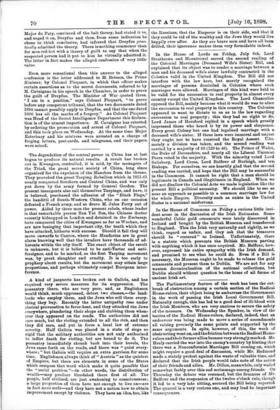In the House of Lords on Friday, July 8th, Lord
Strathcona and Monntroyal moved the second reading of the Colonial Marriages (Deceased Wife's Sister) Bill, and explained that its object was to render a marriage between a man and his deceased wife's sister lawfully contracted in the Colonies valid in the United Kingdom. The Bill did not interfere with the law here, but merely recognised the marriages of persons domiciled in Colonies where such marriages were allowed. Marriages of this kind were held to be valid for the succession to real property in almost every country except the United Kingdom. The Lord Chancellor opposed the Bill, mainly because what it would do was to alter the succession to real property in this country. The Colonies appeared to want to dictate to us as to the law regarding succession to real property ; this they had no right to do. Lord James of Hereford replied in a speech which greatly impressed those who heard it by its power and eloquence. Every great Colony but one had legalised marriage with a. deceased wife's sister. If these laws were immoral and unjust they ought not to have received the Royal Assent. Ulti- mately a division was taken, and the second reading was carried by a majority of 83 (129 to 46). The Prince of Wales, the Duke of Devonshire, and nearly all the Liberal Unionist Peers voted in the majority. With the minority voted Lord Salisbury, Lord Cross, Lord Balfour of Burleigh, and ten Bishops. For ourselves, we are heartily glad that the second reading was carried, and hope that the Bill may be successful in the Commons. It cannot be right that a man should be legitimate in Canada and illegitimate in England. When we did not disallow the Colonial Acts we made legislation like the present Bill a political necessity. We should like to see as near an approach as possible to a common marriage law for the whole Empire. Diversity such as exists in the United States is a national misfortune.


































 Previous page
Previous page